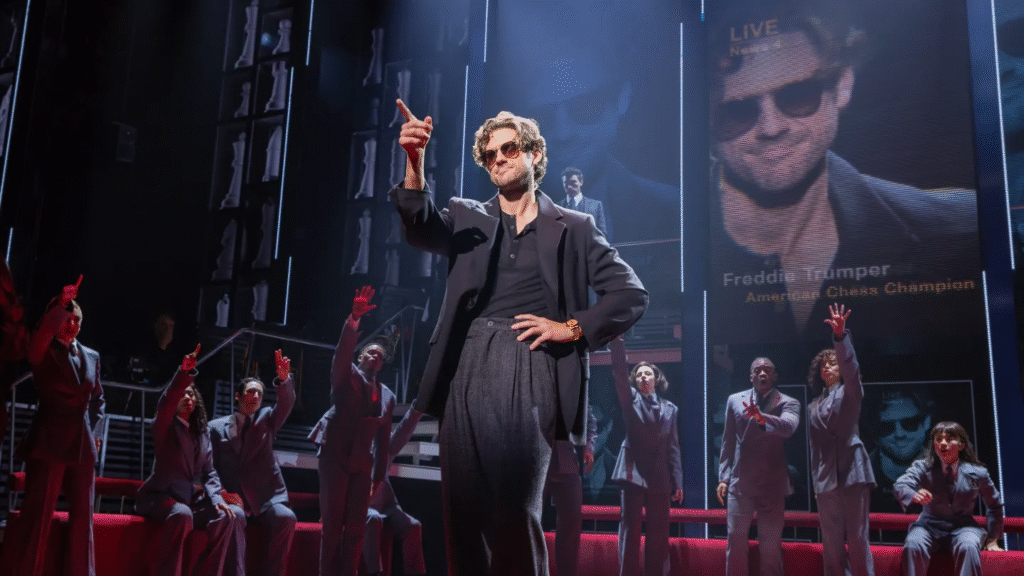The Broadway revival of Chess has arrived with a bold new creative vision, captivating performances, and a modern emotional edge. This article breaks down what makes the new staging unforgettable, why fans and newcomers are reacting so strongly, and how the show transforms a beloved musical into a contemporary powerhouse.
The New Broadway Revival of Chess Is the Talk of the Theatre World

The legendary musical Chess is back on Broadway with a boldness and emotional intensity that’s already sparking huge conversations across the theatre community. Whether you’re a longtime fan who knows every note of “I Know Him So Well” or someone discovering the show for the first time, this revival isn’t just a nostalgic return—it’s an entirely new experience built on reinvention, dynamic staging, and powerhouse performances.
The musical, famously known for its ABBA-crafted melodies and Cold War drama, often intimidates directors because of its complexity. This version, however, leans into the challenge and transforms it into something beautifully modern. The energy feels larger, the story cuts deeper, and the overall execution suggests that Chess is no longer just a cult favorite—it’s a Broadway contender all over again.
A Revival That Respects the Past While Stepping Into the Present
The creative team behind this production clearly understood the delicate balance between honoring the show’s original DNA and shaping it into something today’s audiences can emotionally connect with.
The music and characters remain at the heart of the show, but the execution feels sharper, faster, and more grounded. Each emotional beat lands harder because instead of relying on spectacle alone, the show focuses on the characters’ internal conflicts—ambition, loyalty, fear, and the cost of genius.
This revival also takes advantage of modern production tools, blending old-school drama with cutting-edge visuals to expand the universe of the story without overshadowing it.
The Cast Breathes New Life Into Familiar Characters
A musical as emotionally complex as Chess demands performers who can balance technical skill with raw vulnerability—and this cast does exactly that.
The Leads Deliver Stunning Vocal Performances
The principal actors step into their roles with impressive vocal range and emotional intelligence. Each major number sounds fuller and more emotionally charged than many previous productions. Instead of simply showcasing vocal power, the performers emphasize storytelling through their voices.
Chemistry That Feels Natural
The complicated relationship triangle—central to Chess—is fully alive onstage. Every argument, confession, and moment of connection feels organic. The tension, especially between the American and Russian rivals, plays out with palpable electricity.
Supporting Characters Add Depth
This revival doesn’t treat supporting roles as filler. Instead, the secondary characters layer the political and emotional atmosphere of the show, grounding the high-stakes tension with diverse perspectives and strong narrative contributions.
Visuals, Staging, and Lighting That Transform the Experience
One of the most striking elements of the new Chess revival is its visual design. While the musical’s theme already lends itself to metaphor and high drama, this staging finds a way to make the storytelling feel both surreal and intimate.
Lighting That Mirrors the Emotional Shifts
Lighting becomes almost another character—moving fluidly through warm tones, sharp contrasts, and dramatic shadows depending on the emotional tone of each scene. It heightens the tension of the chess matches and brings vulnerability into the softer, more personal moments.
A Set That Supports, Not Distracts
Instead of overwhelming the audience with elaborate scenery, the set embraces minimalism with purpose. Every piece is strategically placed, every transition feels fast and seamless, and the focus remains on the performers and the story.
Clever Use of Projection and Multimedia
Modern projections help visualize the political context, the international stakes, and the psychological pressure of competition. They make the world feel larger without sacrificing intimacy.
A Fresh Emotional Interpretation of the Story
This revival takes a deeper emotional angle than many previous versions. While the political and competitive tensions remain essential, this version dives into the human cost behind the headlines.
Relationships Feel More Grounded
The emotional connections feel more honest, exploring how ambition can fracture even the strongest bonds. Instead of melodrama, the revival gives us nuanced, layered relationships.
Power and Politics Take a Backseat to Humanity
While the Cold War setting remains important, the revival doesn’t let the geopolitics overpower the human story. The result is a narrative that feels accessible, relatable, and resonant for modern audiences.
The Theme of Identity Takes Center Stage
This version explores the idea of self—how each character struggles to define themselves beyond external expectations. Whether it’s a chess prodigy fighting against pressure or a partner torn between loyalty and personal truth, the show taps into universal emotions.
The Music Still Steals the Show—and Feels Surprisingly Fresh
The music of Chess has always been one of its biggest strengths. But this revival finds ways to make the classic score feel freshly energized while keeping its iconic flavor.
Iconic Songs Reimagined With New Emotion
Numbers like “Someone Else’s Story,” “Anthem,” and “Nobody’s Side” gain new emotional depth thanks to more contemporary vocal approaches and subtle stylistic adjustments.
Ensemble Numbers Bring the Drama
The full cast pieces sound rich and layered, amplifying the stakes and immersing the audience in the world of high-pressure chess rivalry.
ABBA’s Influence Remains Intact
Even with modern touches, the timeless ABBA-crafted melodies remain the emotional engine of the production.
Audience Reactions: A Buzz That’s Hard to Ignore
Early reactions to the revival are overwhelmingly positive. From the moment the curtain rises, audiences are drawn into an intense world filled with sharp musicality, expertly delivered drama, and striking visuals.
Theatre Fans Are Calling It a Must-See
People are praising its bold direction, emotional clarity, and magnetic cast performances.
New Audiences Are Connecting With It
Even those unfamiliar with Chess are finding the revival surprisingly approachable and emotionally compelling.
Critics Are Acknowledging Its Freshness
While interpretations vary, most agree that this staging brings new life to a musical long known for its complexity.
Why This Revival Matters Right Now
In an era where Broadway is blending nostalgia with reinvention, Chess stands as a shining example of how to honor the past while embracing the present.
It’s a reminder that theatre evolves with its audience, and powerful stories—when retold thoughtfully—can feel brand new again. This production doesn’t just revive Chess; it reintroduces it to a new generation.
Also Read : Maxon Margiela Dies at 21: Rising Orlando Rapper’s Tragic End and Legacy
FAQs
What makes this Chess revival different from previous versions?
It emphasizes emotional storytelling, modern visuals, and grounded character interpretations while maintaining the iconic music.
Is the show good for people who don’t know the original musical?
Absolutely. This revival is easy to follow and emotionally engaging for newcomers.
Are the songs the same as before?
Yes, the classic score remains intact, but the arrangements and vocal delivery make them feel refreshed and modern.
Is the production more political or personal?
While the political backdrop remains, this version focuses more on individual relationships and emotional conflict.
Should I see this revival if I’ve watched earlier productions?
Definitely. This interpretation offers new layers, modern staging, and a stronger emotional core that feels like a fresh experience.
Join our WhatsApp channel for more updates and information about celebrities and entertainment.

I’m Atul Kumar, founder of Cine Storytellers and an entertainment creator with 5+ years of experience. I cover films, celebrities, music, and OTT content with a focus on accurate, ethical, and engaging storytelling. My goal is to bring readers trustworthy entertainment news that informs, inspires, and goes beyond gossip.
Discover more from Cine Storytellers
Subscribe to get the latest posts sent to your email.
